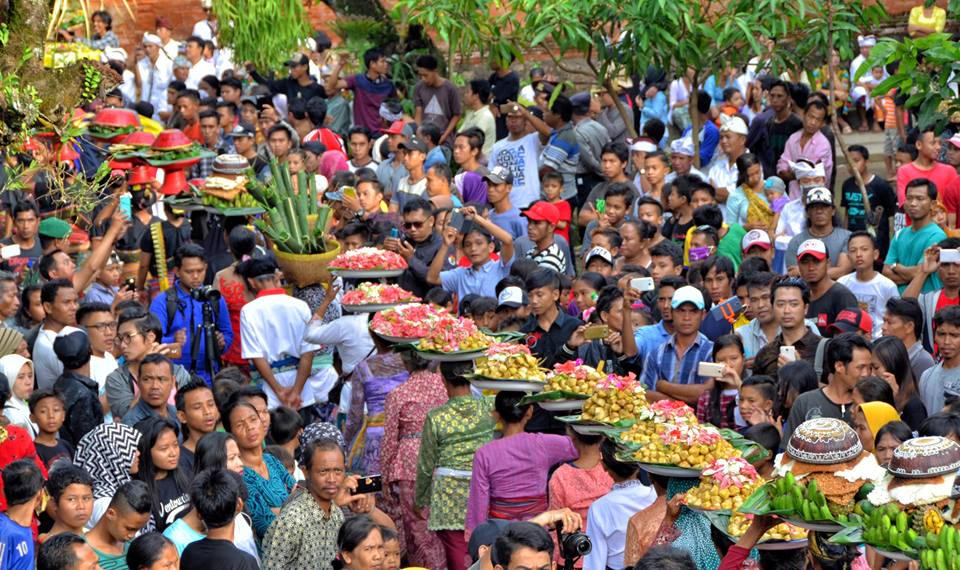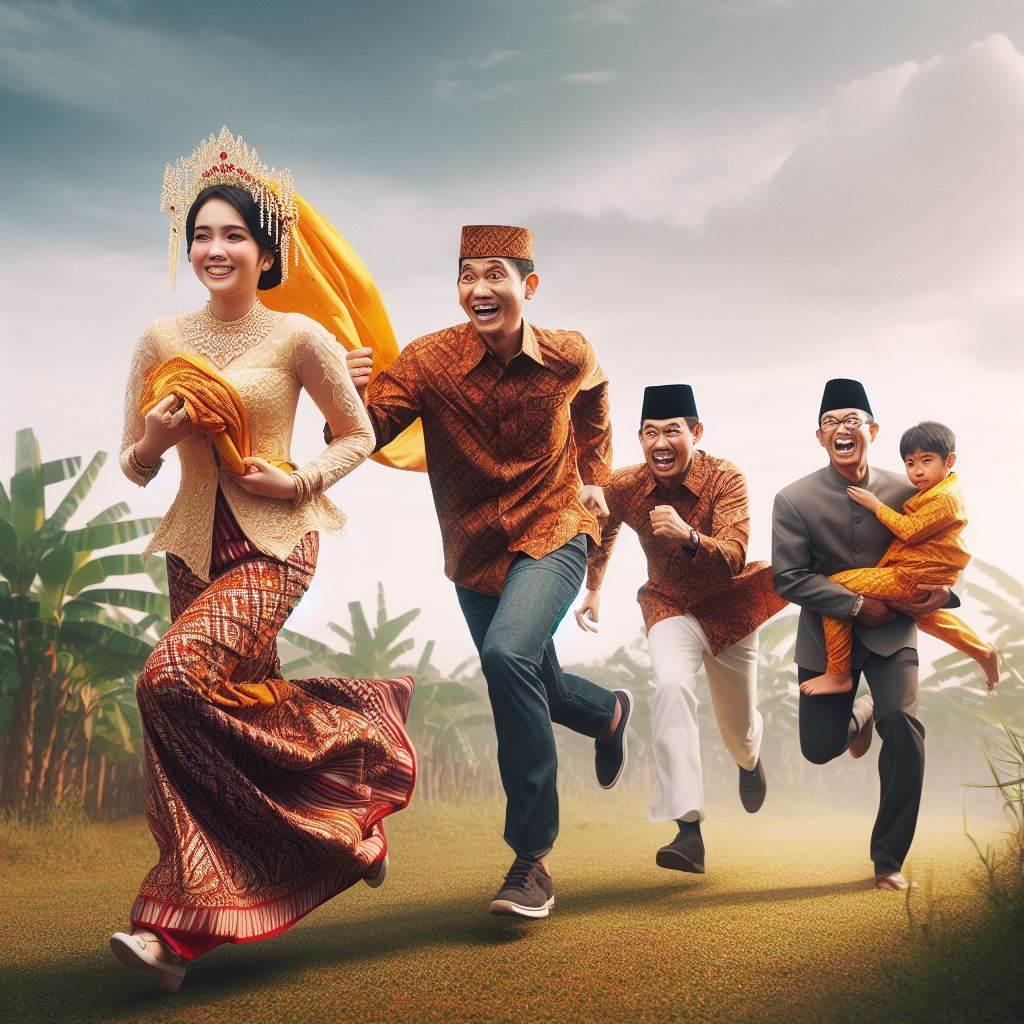Lombok, an island in the province of West Nusa Tenggara (NTB), Indonesia, is known for its natural beauty and rich cultural heritage. Lombok is home to various ethnic groups, such as the Sasak, Balinese, Chinese, Arab, and Bugis, who live in harmony and respect each other’s traditions.
Lombok has many unique cultures that reflect the history, beliefs, and values of its people. Some of these cultures are:
Peresean: The Rattan Stick Duel

Peresean is a tradition of two men fighting with rattan sticks and buffalo skin shields. This tradition is the pride of NTB residents, especially the Sasak tribe, who practice it as a form of entertainment, sport, and ritual. Peresean is usually held during special occasions, such as religious festivals, weddings, or harvest celebrations.
The participants, called pepadu, are selected from the audience based on their courage and willingness. They wear traditional clothes and headbands, and are accompanied by music and cheers from the spectators.
The fight is supervised by a referee, called pakembar, who sets the rules and stops the fight when one of the pepadu is injured or surrenders. The winner is awarded with money or other prizes, while the loser is respected for his bravery.
Peresean is believed to have originated from the ancient times, when the Sasak people had to defend themselves from invaders, such as the Dutch, the Japanese, and the Balinese.
Peresean symbolizes the spirit of resistance, resilience, and unity of the Sasak people. Peresean also serves as a way of expressing gratitude to the ancestors and the gods, as well as a means of socializing and strengthening bonds among the community.
Rubbing the Floor with Livestock Dung
Rubbing the floor with livestock dung is a tradition that is still practiced by some people in Lombok, especially in rural areas. This tradition is believed to make the floor shinier and mosquitoes are reluctant to come near it.
The dung used for this purpose is usually from cows, buffaloes, or goats, which are considered sacred animals by the Sasak people. The dung is mixed with water and applied to the floor using a broom or a cloth. The floor is then left to dry and polished with a coconut husk.
Rubbing the floor with dung is not only a matter of hygiene, but also a matter of culture and faith. The Sasak people believe that by doing this, they are honoring the animals that provide them with food, milk, and transportation.
They also believe that the dung has a spiritual power that can ward off evil spirits and bring blessings to the house and its inhabitants.
Topat War: A Symbol of Peace and Harmony

Topat war is a traditional event at Lingsar Temple, which is a unique temple that is shared by Muslims and Hindus in Lombok. Topat war is held every year, usually in December, to coincide with the full moon of the sixth month in the Sasak calendar.
Topat war is a friendly war, where the participants throw topat, or rice cakes wrapped in coconut leaves, at each other. The topat are prepared by both Muslims and Hindus, and are blessed by the priests of both religions.
The topat war is preceded by a ritual procession, where the participants walk from the temple to the nearby river, carrying offerings and banners. The topat war takes place at the river bank, where the participants are divided into two groups: one representing the Muslims, and the other representing the Hindus. The topat war lasts for about an hour, and ends with a prayer and a feast.
Topat war is a symbol of peace and harmony between Muslims and Hindus in Lombok, who have coexisted for centuries.
Topat war is a way of celebrating the diversity and the unity of the people of Lombok, as well as a way of expressing gratitude to the gods and the nature for the abundance of crops and water. Topat war is also a way of having fun and sharing joy with each other.
Eloping: A Unique Wedding Tradition

Eloping is a Sasak tribe wedding tradition that is preceded by the concept of “kidnapping”. In this tradition, the groom and his friends “kidnap” the bride from her house, without the consent of her parents.
The bride is then taken to the groom’s house, where she stays for a few days. During this time, the groom’s family tries to persuade the bride’s family to accept the marriage and pay a dowry.
The bride’s family usually pretends to be angry and reluctant, but eventually agrees to the marriage and visits the groom’s house to bring gifts and blessings. The marriage is then formalized by a religious ceremony and a reception.
Eloping is a tradition that dates back to the time when the Sasak people were oppressed by the Balinese rulers, who often took their daughters as concubines. Eloping was a way of protecting the Sasak women from being taken away by force.
Eloping was also a way of avoiding the expensive and complicated wedding arrangements that were imposed by the Balinese culture. Eloping is still practiced today by some Sasak people, especially those who live in remote areas or have a low economic status.
Eloping is seen as a romantic and adventurous way of getting married, as well as a way of testing the love and commitment of the couple.
Nyongkol: A Modern Marriage Tradition

Nyongkol is a marriage tradition that is still developing today, especially among the young and educated Sasak people. Nyongkol is a form of arranged marriage, where the parents of the bride and the groom play a major role in choosing the partner for their children.
Nyongkol is different from the traditional arranged marriage, where the parents decide everything without the consent of the children. In nyongkol, the parents only suggest and introduce the potential partner to their children, who have the right to accept or reject the proposal.
The parents also respect the preferences and criteria of their children, such as education, occupation, personality, and religion.
Nyongkol is a tradition that reflects the changing values and lifestyles of the Sasak people, who are becoming more modern and progressive. Nyongkol is a way of balancing the traditional and the contemporary, the individual and the collective, the love and the logic.
Nyongkol is also a way of maintaining the family and the social ties, as well as the cultural and the religious identity of the Sasak people.
Begawe: A Community Celebration

Begawe is a massive party held among the community as a form of gratitude. Begawe can be held for various reasons, such as celebrating a successful harvest, a birthday, a graduation, a promotion, or a recovery from an illness.
Begawe is usually initiated by a person or a family who wants to share their happiness and fortune with others. Begawe involves inviting the whole village or neighborhood to join the party, which can last for a day or more. Begawe features various activities, such as music, dance, games, competitions, and performances.
Begawe also features a feast, where the host provides a lot of food and drinks, such as rice, meat, vegetables, fruits, cakes, coffee, and palm wine.
Begawe is a tradition that shows the generosity and the hospitality of the Sasak people, who believe that sharing is caring. Begawe is also a way of strengthening the social and the cultural bonds among the community, as well as a way of preserving the local arts and the customs.
Begawe is a manifestation of the Sasak philosophy of life, which is “beramal, bersyukur, dan bergembira”, meaning “to do good deeds, to be grateful, and to be happy”.
Mekare-kare: The Pandan War

Mekare-kare is the tradition of pandan wars carried out as part of the Bau Nyale celebration. Bau Nyale is a festival that commemorates the legend of Princess Mandalika, a beautiful and wise princess who sacrificed herself to the sea to avoid a war between the princes who wanted to marry her.
Bau Nyale means “to catch the sea worms”, which are believed to be the reincarnation of Princess Mandalika. Bau Nyale is held every year, usually in February or March, at several beaches in Lombok, such as Seger, Kuta, Aan, and Tanjung.
Bau Nyale attracts thousands of people, both locals and tourists, who come to witness and participate in the festival. Bau Nyale features various activities, such as praying, fishing, cooking, eating, and trading the sea worms, as well as cultural performances, such as music, dance, and poetry.
Mekare-kare is one of the highlights of the Bau Nyale festival, which is held at Seger Beach. Mekare-kare is a ritual fight between two groups of young men, who use pandan leaves as weapons and bamboo shields as protection.
The pandan leaves have sharp thorns that can cause bleeding and pain. The fight is accompanied by traditional music and chants, and is watched by a large crowd. The fight is not meant to hurt or injure, but to honor and remember the bravery and the sacrifice of Princess Mandalika.
The fight is also a way of showing the skills and the spirit of the young men, who are considered the successors of the princes who fought for Princess Mandalika. The fight is followed by a healing ritual, where the wounds are treated with turmeric and salt water.
Mekare-kare is a tradition that preserves the history and the legend of the Sasak people, who are proud of their ancestry and culture. Mekare-kare is also a tradition that promotes the values of courage, loyalty, and sportsmanship among the youth.
Mekare-kare is a unique and exciting attraction that draws many visitors to Lombok, who want to experience the thrill and the beauty of the pandan war.
Lombok is a land of diverse and unique cultures that reflect the richness and the diversity of its people. Lombok is a place where tradition and modernity coexist in harmony and balance.
Lombok is a destination that offers not only natural wonders, but also cultural wonders that are worth exploring and appreciating. Lombok is a treasure that is waiting to be discovered and enjoyed by the world.

